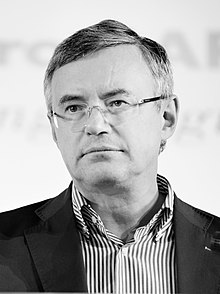Alessandro Barbero | |
|---|---|
 Barbero in 2015 | |
| Born | 30 April 1959 Turin, Italy |
| Awards |
|
| Academic background | |
| Education | University of Turin (1981) |
| Alma mater | Scuola Normale Superiore di Pisa |
| Academic advisors | Giovanni Tabacco |
| Academic work | |
| Discipline | Medieval, late antiquity, and military history |
| Institutions | University of Eastern Piedmont (1998–present) University of Rome Tor Vergata (1984–1998) |
Alessandro Barbero (born 30 April 1959) is an Italian historian, novelist and essayist.
Barbero was born in Turin. He attended the University of Turin, where he studied literature and Medieval history. He won the 1996 Strega Prize, Italy's most distinguished literary award, for Bella vita e guerre altrui di Mr. Pyle gentiluomo.[1][2] His second novel, Romanzo russo. Fiutando i futuri supplizi, has been translated into English as The Anonymous Novel. Sensing the Future Torments (Sulaisiadar 'san Rudha: Vagabond Voices, 2010).
Franco Cardini wrote in Il Giornale, "Barbero uses the diabolic skills of an erudite and professional narrator to seek out massacres of the distant and recent past. The Anonymous Novel concerns the past-that-never-passes (whether Tsarist or Stalinist) and the future that in 1988 was impending and has now arrived". Allan Massie wrote in The Scotsman, ""If you have any feeling for Russia or for the art of the novel, then read this one. You will find it an enriching experience", and Eric Hobsbawm wrote in The Observer, "The Anonymous Novel: Sensing the Future Torments, from a new publisher, Vagabond Voices, situated on the Isle of Lewis, is a vivid novel about Russians coping with the transition from communism to capitalism and combines echoes of Bulgakov with elements of a thriller".
Barbero is the author of The Battle, an account of the Battle of Waterloo, which has been translated into English. Other histories he has written which have been translated into English include The Day of the Barbarians, the story of the Battle of Adrianople, and Charlemagne: Father of a Continent.
Barbero is also a commentator and organiser on the Italian cultural scene: he is currently[when?] a member of the Management Committee of the Premio Strega[3] and the Editorial Committee of the magazine Storica; he writes for the literary and cultural pages of Il Sole 24 Ore and La Stampa, and regularly appears on the television programme "Superquark" and radio programme "Alle otto della sera". He is the editor of Storia d'Europa e del Mediterraneo, which is published by Salerno Editore.
In 2005, the Republic of France awarded Barbero with the title of "Chevalier de l'ordre des Arts et des Lettres". In the late 2010s, he acquired remarkable popularity on the Internet thanks to his many conferences uploaded on YouTube, and lessons with hundreds of thousands of views.[4]
((cite book)): CS1 maint: location missing publisher (link)((cite book)): CS1 maint: location missing publisher (link) – Collana Storia e Società, Roma-Bari, Laterza, 2021. ISBN 978-88-581-4527-2.((cite book)): CS1 maint: location missing publisher (link)((cite book)): CS1 maint: location missing publisher (link)((cite book)): CS1 maint: location missing publisher (link)((cite book)): CS1 maint: location missing publisher (link)((cite book)): CS1 maint: location missing publisher (link)((cite book)): CS1 maint: location missing publisher (link)((cite book)): CS1 maint: location missing publisher (link)((cite book)): CS1 maint: location missing publisher (link)((cite book)): CS1 maint: location missing publisher (link)((cite book)): CS1 maint: location missing publisher (link) – Vincitore del Premio Strega 1996, tradotto in sette lingue.((cite book)): CS1 maint: location missing publisher (link)((cite book)): CS1 maint: location missing publisher (link)((cite book)): CS1 maint: location missing publisher (link)((cite book)): CS1 maint: location missing publisher (link) – Vincitore del "Premio Alessandro Manzoni – città di Lecco" 2011.[5]((cite book)): CS1 maint: location missing publisher (link)((cite book)): CS1 maint: location missing publisher (link)((cite book)): CS1 maint: location missing publisher (link)((cite book)): CS1 maint: location missing publisher (link)((cite book)): CS1 maint: location missing publisher (link) – con uno scritto di A. Barbero, Collana Oscar Classici n.663, Milano, Mondadori, 2012. ISBN 978-88-045-8590-9; Collana La memoria n.1219, Palermo, Sellerio, 2022. ISBN 978-88-389-4269-3.((cite book)): CS1 maint: location missing publisher (link) – Vercelli, Effedì, 2020. ISBN 978-88-859-5062-7.